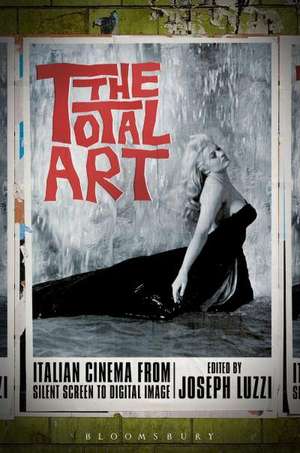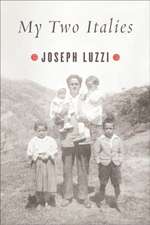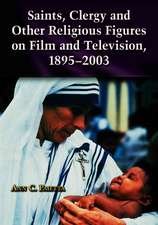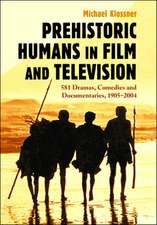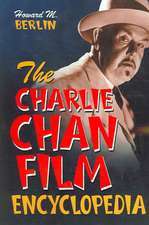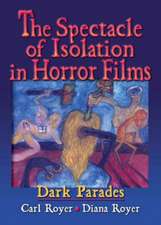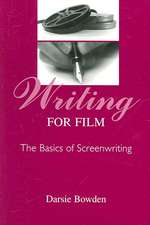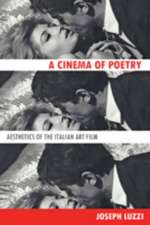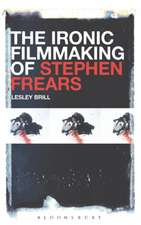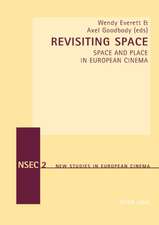Italian Cinema from the Silent Screen to the Digital Image
Editat de Joseph Luzzien Limba Engleză Paperback – 19 feb 2020
| Toate formatele și edițiile | Preț | Express |
|---|---|---|
| Paperback (1) | 231.46 lei 22-36 zile | |
| Bloomsbury Publishing – 19 feb 2020 | 231.46 lei 22-36 zile | |
| Hardback (1) | 719.57 lei 43-57 zile | |
| Bloomsbury Publishing – 19 feb 2020 | 719.57 lei 43-57 zile |
Preț: 231.46 lei
Preț vechi: 262.36 lei
-12% Nou
Puncte Express: 347
Preț estimativ în valută:
44.29€ • 46.37$ • 36.65£
44.29€ • 46.37$ • 36.65£
Carte disponibilă
Livrare economică 17-31 martie
Preluare comenzi: 021 569.72.76
Specificații
ISBN-13: 9781441195616
ISBN-10: 1441195610
Pagini: 440
Ilustrații: 59 bw illus
Dimensiuni: 152 x 229 x 34 mm
Greutate: 0.7 kg
Editura: Bloomsbury Publishing
Colecția Bloomsbury Academic
Locul publicării:New York, United States
ISBN-10: 1441195610
Pagini: 440
Ilustrații: 59 bw illus
Dimensiuni: 152 x 229 x 34 mm
Greutate: 0.7 kg
Editura: Bloomsbury Publishing
Colecția Bloomsbury Academic
Locul publicării:New York, United States
Caracteristici
Identifies major periods, film/makers, and issues, such as the era of silent cinema, Fellini and Antonioni, and the influence of fascism on the movies, respectively
Notă biografică
Joseph Luzzi is Associate Professor of Italian and Director of Italian Studies at Bard College, USA, and the author of Romantic Europe and the Ghost of Italy (2008), which received the MLA's Scaglione Prize for Italian Studies and was named an Outstanding Academic Title by Choice (2009).
Cuprins
List of ContributorsGlossaryMattia Acetoso (Boston College, USA)Chronology Mattia Acestoso (Boston College, USA)IntroductionJoseph Luzzi (Bard College, USA)Part I - Chronologies and Movements1. Italian Silent FilmAntonio Costa (Università di Padova, Italy)2. Futurism and FilmMichael Syrimis (Tulane University, USA)3. The Never-Ending Story of Film and FascismVito Zagarrio (Università di Roma Tre, Italy)4. NeorealismGiuliana Minghelli (McGill University, Canada)5. The Orphaned Generation: Cinema of the 1980s and 1990sAlessia Ricciardi (Northwestern University, USA)6. Persistence of Vision: Realism and the Popular in Italian Cinema of the New MillenniumMillicent Marcus (Yale University, USA)Part II - Gender, Genre, Theory7. The Five Faces of the Italian Femme FataleStephen Gundle (University of Warwick, UK)8. Italian Women's Cinema and the Wounded Filmic BodyDana Renga (The Ohio State University, USA)9. The Cinematic Evolution of Commedia all'ItalianaMarcia Landy (University of Pittsburgh, USA)10. Popular Italian CinemaCatherine O'Rawe (University of Bristol, UK)11. Italian Film Theory, 1907-2015Gabriele Pedullà (Università di Roma Tre, Italy)Part III - Relations and Debates12. Film Music: "Kaos and the Taviani"Daniela Bini (University of Texas, Austin, USA)13. Photography and FilmSarah Carey (McGraw-Hill Education)14. Television and FilmStefano Baschiera (Queen's University Belfast, UK)15. Italian Documentary and the Predicaments of the AuteurLuca Caminati (Concordia University, Canada) and Mauro Sassi (Independent Scholar)16. The Global Impact of Italian NeorealismLaura E. Ruberto (Berkeley City College, USA) and Kristi M. Wilson (Soka University of America, USA)Part IV - Films in Focus17. CabiriaRobert Rushing (University of Illinois, Urbana-Champaign, USA)18. SensoBrendan Hennessey (Binghamton University, USA)19. Bitter RiceCharles L. Leavitt IV (University of Notre Dame, USA)20. La stradaFederico Pacchioni (Chapman University, USA)21. L'avventuraJohn David Rhodes (University of Cambridge, UK)22. Once upon a Time in the WestMaryann McDonald Carolan (Fairfield University, USA)23. TheoremRobert S.C. Gordon (University of Cambridge, UK)24. The ConformistMichael Cramer (Sarah Lawrence College, USA)25. Love and AnarchyBernadette Luciano (University of Auckland, New Zealand)26. The Best of YouthAlan O'Leary (University of Leeds, UK)Part V - Behind the Scenes27. Sound and Soundtrack in Italian CinemaMonica Facchini (Colgate University, USA)28. ScreenwritingCosetta Gaudenzi (University of Memphis, USA)29. Open-Air CinemaAllison Cooper (Bowdoin College, USA)Index
Recenzii
This collection of carefully-researched essays forms a multifaceted, functional, and up-to-date reference volume that should be on the shelf of every cinephile and student of Italian cinema.
The writers assembled here by Joseph Luzzi - some of them well-known scholars at the top of their game, others new voices emerging with power and flair - engage us at all stages of this rich new volume on Italian cinema. Here is a reference work that makes good its title promise - to cover an entire history, from the age of silent screen to digital images of more than a century later. The various chapters weave pathways into existing knowledge, extending lines of inquiry in a variety of enticing directions. Individual film critics here take different approaches, but in all cases the writing styles are cogent, intriguing, and a challenge both to other scholars and to the general reader. A clear overall chronology by Mattia Acetoso leads the volume. Each further chapter has a comprehensive bibliography and filmography of the particular aspect of Italian cinema under consideration. In all respects the contributors prove worthy of the volume's dedicatee, Millicent Marcus, whose pioneering work in the field has for decades drawn others magnetically to it, and whose own contribution here is one of many pieces of exemplary exploration. Those readers who are well acquainted with aspects of Italian cinema will find their senses of it revitalised, discovering unknown films to watch and old favourites to consider in new ways. Those by contrast who so far know relatively little will receive guidance here, and stimulation to commence their own exploration with fascination and in bold individual ways. Here is a volume that will enhance love of and expertise about Italian cinema - and indeed Italian culture more generally, since all the contributions are richly contextualised - for many years to come.
The writers assembled here by Joseph Luzzi - some of them well-known scholars at the top of their game, others new voices emerging with power and flair - engage us at all stages of this rich new volume on Italian cinema. Here is a reference work that makes good its title promise - to cover an entire history, from the age of silent screen to digital images of more than a century later. The various chapters weave pathways into existing knowledge, extending lines of inquiry in a variety of enticing directions. Individual film critics here take different approaches, but in all cases the writing styles are cogent, intriguing, and a challenge both to other scholars and to the general reader. A clear overall chronology by Mattia Acetoso leads the volume. Each further chapter has a comprehensive bibliography and filmography of the particular aspect of Italian cinema under consideration. In all respects the contributors prove worthy of the volume's dedicatee, Millicent Marcus, whose pioneering work in the field has for decades drawn others magnetically to it, and whose own contribution here is one of many pieces of exemplary exploration. Those readers who are well acquainted with aspects of Italian cinema will find their senses of it revitalised, discovering unknown films to watch and old favourites to consider in new ways. Those by contrast who so far know relatively little will receive guidance here, and stimulation to commence their own exploration with fascination and in bold individual ways. Here is a volume that will enhance love of and expertise about Italian cinema - and indeed Italian culture more generally, since all the contributions are richly contextualised - for many years to come.
